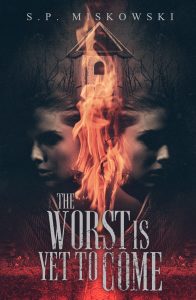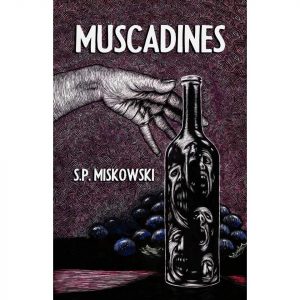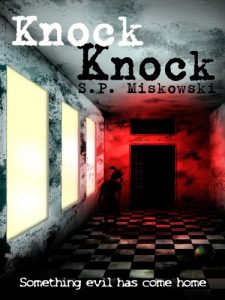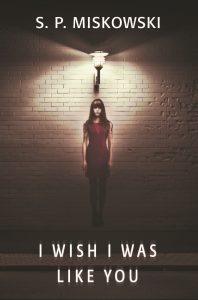Today’s terrific Ten Questions interview, courtesy of our colonial correspondent Duane Pesice, considers a talented and much admired author of the modern weird, one S P Miskowski. Or for those who insist, S. P. Miskowski. We prefer to save up all those little dots for ellipses… We also add some of our usual useless historical trivia notes, because we clearly have a problem.
A substantial part of S P Miskowski’s work is set in her fictional world of Skillute, Washington, which came to the fore once again this year with her latest novel, The Worst is Yet to Come (Trepidatio, 2019).
A rusty pinwheel creaked gently in the cool breeze. Some of the loose blocks of wood were impossible to identify, having fallen off of other structures or worked their way out from under various platforms built to support the birdhouses.
On either side of the rusty pinwheel stood a boy and a girl, their pallor and wasted limbs a stark contrast to the late afternoon sunlight streaking the garden, both of them invisible to Tasha and Briar. The boy and girl exchanged a glance, and the boy put a finger to his lips. This prompted a giggle from the girl, a sharp little outburst like the cry of a laughing thrush.
“Do you get the feeling something bad happened here?” Briar asked.
S P says elsewhere of the town:
“Skillute is the fictional setting for my first novel Knock Knock, novellas Delphine Dodd, Astoria and In the Light (Omnium Gatherum) as well as an origin story for one of the characters, soon to be published in the anthology Sisterhood edited by Nate Pedersen (Chaosium). Each may be read as a stand-alone but there are overlapping and intersecting characters and events that take on new meaning if you read all of the stories. Over the course of these tales the setting has altered, its history becoming entwined with the fate of its residents, and the land itself has taken on a central role.
“I decided to let Skillute guide me this time. The result is a psychological and supernatural story of longing, of illusions clouding reality, of escape and the desire to belong.”
How Sir Edward Bulwer-Lytton became a Miskowski
What you may not know is that Skillute is also the name for an indigenous American people who spoke Chinook Jargon, once used by many in the Northwest as a trade tongue. A Chinook Jargon word you should know is potlach, the gift-giving ceremony from which we may get ‘potluck’, except that English already had that word, so we probably didn’t. Plus yes, that’s where the name of the helicopter comes from – the Chinook peoples.

One non-native chap who did speak Chinook Jargon was the first Governor of the Colony of British Columbia, Sir James Douglas, who renamed the former Hudson Bay Company Fort Dallas as Lytton, British Columbia – in honour of Sir Edward Bulwer-Lytton. Slightly surprising, as Douglas spent a lot of time feuding with the Lytton-approved appointee Richard Clement Moody, the first Lieutenant-Governor of British Columbia.
Douglas’ mother was what they called a Barbados Creole, of mixed African and European descent, and although she was a freewoman, there is a suggestion that Moody, from a grand family, looked down on Douglas because of this.
Where were we headed? Oh yes, Bulwer-Lytton, who oversaw Moody’s appointment, was a friend and contemporary of Charles Dickens, and wrote a number of weird bits of fiction. He coined the term ‘dweller on the threshold’ beloved of early horror writers, was responsible for that infamous opening line “It was a dark and stormy night…”, and wrote the famous story ‘The Haunted and the Haunters’ or ‘The House and the Brain’ (1859).

And he came up with “the pen is mightier than the sword”. We would say more on his influence, but as Bulwer-Lytton drew on theosophy, which we have covered here before, and invented vril and so much other stuff relevant to the weird fiction field, it would all get out of hand.
So there’s your connection. Unless S P Miskowski started her writing career with a faulty spell-checker, and meant ‘skillet’ all along.
We’re currently reading The Worst is Yet to Come – admittedly in snatched sessions between lurcher-wrangling and trying to grab that lump of cheddar before Django snatches it off the table. If there is any justice, we might eventually post a review, as well. In the meantime, here’s the interview, to get you in the mood:
The Full S P Miskowski
by Duane Pesice
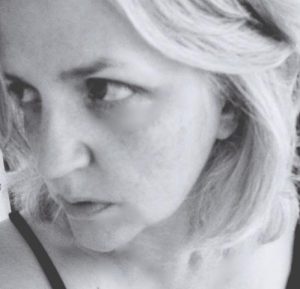
“I think we still have a deep fear of admitting how violent women can be. We can’t reconcile female cruelty with our sacred mythology around motherhood.”
Duane: Where should a reader that is new to your work start?
S P: My first novel, Knock Knock, offers a reliable indication of my obsessions and my general approach to storytelling. Although I’ve used a range of styles, points of view, and settings in my books, I’d say if you don’t find anything of interest in Knock Knock you probably won’t love the rest of my work.
Duane: Is there a piece that you are particularly proud of?
S P: Muscadines, a wicked novella in which a character’s sincere journey of self-discovery turns out to be a bad, bad thing. Although the book (published by Dunhams Manor Press) was a finalist for a Shirley Jackson Award and people who like it find it vivid and memorable, it isn’t widely read. It’s almost as if people are disturbed by the idea of three middle-aged sisters resurrecting their childhood as daughters and henchmen to a vicious killer named Ruth Parker. (LOL) This female-centric tale is probably the most poetic thing I’ve written and certainly the most brutal.
I think we still have a deep fear of admitting how violent women can be. We can’t reconcile female cruelty with our sacred mythology around motherhood. Every time we try, we end up making excuses to return to a comfortable place where all women possess maternal instinct and want to care for babies.
Women are everywhere in my fiction. I want to write the full range of possibilities, not only roles and actions most people think of as ‘women’s concerns’ but everything—every possible act. Because people are capable of so many things, and if we refuse to acknowledge women as perpetrators of violence, we are saying that we refuse to see women as human.
Transgressive fiction should seek to injure expectations and leave a scar. Give the reader something new to consider. Muscadines does that, I hope.
Duane: Whose work do you read, yourself?
S P: I read widely, non-fiction and fiction. I’m interested in everything. For clarity and pure joy I return time and again to Janet Malcolm, Flannery O’Connor, and Shirley Jackson.
Duane: What kind of beer goes with your pizza? And what’s on the pizza?
S P: I’ll take a blood orange blonde—in a bottle. Olive oil, mozzarella, goat cheese, roasted garlic, oregano, and basil.
Duane: Do you consider your work weird, or horror? Or do you leave that to the marketing department?
S P: I am the weird thing. I write the horror. To answer more seriously, horror is close to my heart and I like to think what I’m writing can be classified as horror, whether supernatural or psychological. But I’m not much concerned about categories. I’m concerned about telling the truth no matter how painful it might be.
My life has taught me to be on the lookout for hypocrisy, and to ask hard questions. With each story I try to fuse atmosphere and action, character and setting. But these are technical aims. In terms of content, my wish is to peel away all of the layers we create to conceal what we really are. The resulting fiction is usually horror or something close to it. Readers can decide whether or not I’ve done a good job.
Duane: You’ve been convicted of crimes against the empire. What would be your last meal? Include something big to hide the explosives in.
S P: That meal would be French. A seven-course meal prepared by Eric Ripert, please. I’d go for the obvious and put a bomb in the bombe. No one will suspect the bombe, right?
Duane: Are you involved in any arts besides writing? Any odd hobbies we should know about?
S P: I love to ride trains. Not much of a hobby, is it? I’ve tried many things including modern dance, martial arts, sewing, skating, cooking, and pottery. I’m awful at all of these. I tend to dabble. Writing fiction is the only activity to hold my interest over the years. I’ve been making up stories to entertain other people since I was three or four years old.
Duane: Cats or dogs?
S P: I love both. My current partner in crime is feline.
Duane: Tell us about a work-in-progress.
S P: At the moment I’m revising a novel and writing a novella. The novel is about two women and how the breakup of their brief friendship has unexpected, tragic consequences. The novella concerns a woman whose dull life is made more colorful by her obsessive attraction to a washed-up TV actor.
Duane: Thanks for being so kind. Is there anything else you would like readers to know?
S P: If they Google my peculiar name, they will find my website and my author page on Amazon. My books are published by Omnium Gatherum and JournalStone and can be ordered through any independent bookstore. Happy reading!
So go buy S P Miskowski books. You can also support Duane’s latest publishing endeavour at Oxygen Man Books here:
